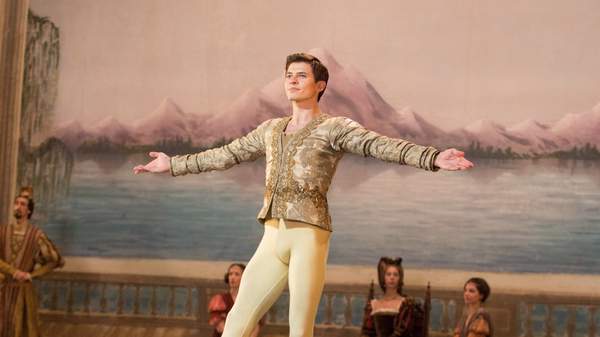Overview
Never one to embrace cliches as an actor or director, Ralph Fiennes avoids the obvious with his latest film. While The White Crow tells the involving tale of Rudolf Nureyev, the biopic doesn't quite dance across the screen. Although it features exceptional sequences of real-life dancer and first-time actor Oleg Ivenko as the Russian ballet great, it doesn't ever let its subject's distinctive talents do the heavy lifting, or explain them away as a product of his difficult existence. There's still a flow and a rhythm to the movie, yet it's never exactly fluid. The film doesn't deny that Nureyev and his skills were influenced by the world around him, or ignore the struggles it caused him, but it doesn't simply connect the clear-cut dots either. All of this is by design, with The White Crow as restless as its central figure. The dancer couldn't ever really be pinned down, so Fiennes daren't waste his third stint behind the camera trying to achieve the impossible.
Rather, as he once again highlights a complicated and conflicted man (as he did with Roman general Coriolanus in his adaption of Shakespeare's tragedy of the same name, and then writer Charles Dickens in The Invisible Woman), Fiennes builds his portrait of Nureyev by watching. The White Crow still spins a story, of course, primarily exploring the 1961 defection from the Soviet Union that'll forever remain synonymous with the ballet dancer. However, the movie particularly revels in gaining its sense of Nureyev through more than biographical data. It's clear that such an approach is behind the film's lead casting, specifically Fiennes' choice of a dancer over an actor. In the expressive yet internalised Ivenko, the picture gains a performer accustomed to conveying everything that transcends words, and one who demands an audience's attention with a fierce gaze and unwavering physicality.
Making the leap from the Tatar State Academic Opera and Ballet Theatre in Kazan to portraying Russia's 'lord of the dance', Ivenko plays Nureyev as determined and dedicated — to his art and to himself. In Rudi's mind, they're both one and the same. Born aboard the Trans-Siberian Express in 1938, he emerges from a bleak childhood to find solace at a St Petersburg dance academy. Under the tutelage of mentor Alexander Pushkin (Fiennes), he's moulded by discipline and structure, though he rankles against the corresponding rules and surveillance. Then, on a visit to Europe while with the Kirov Ballet, Nureyev realises that his art and self will never thrive in his homeland. Parisian lights, sights and parties beckon, as do friendships with French dancer Pierre Lacotte (Raphaël Personnaz) and Chilean-French heiress Clara Saint (Adèle Exarchopoulos). Next comes his decision to flee to the west.
Amidst handsomely shot frames, Fiennes tasks Ivenko with a responsibility placed upon all soloists, asking him to be one of the guiding lights without completely carrying the entire production. Despite his on-screen inexperience, the Ukrainian is certainly capable of the latter, but that's not what a ballet recital or a movie is about. And so, his co-stars add texture and detail around his central role, with Fiennes unsurprisingly the standout supporting player in a solely Russian-speaking part. Another real-life dancer, controversial superstar Sergei Polunin, acquits himself well as fellow Kirov troupe member Yuri Soloviev, whose prowess helps spur Rudi to push his own limits.
From its defection focus, to its observational feel, to its solid performances, The White Crow boasts much that elevates it beyond the tried-and-tested biopic format. Alas, even though David Hare's script doesn't relay its narrative in a linear fashion, the film is far less engaging when it gets overly bogged down in the minutiae of the Cold War-era story — which can veer towards the routine, even for viewers unfamiliar with Nureyev's entire history. The same can be said of the movie's overt thematic nods, including unnecessary visual reminders of the freedom that's abundant abroad but absent under Soviet rule. That's all too straightforward, which Nureyev definitely wasn't.
Although no single scene, on-stage or not, can wholly capture his essence, the ballet legend is better served by The White Crow's contemplative moments; as the title intimates, drawing from a Russian idiom, he's an outsider through and through. Accordingly, when he's seen staring intently at Géricault's painting The Raft of the Medusa and Rembrandt's The Prodigal Son at the Louvre, agonising over their detail and finding an unexpected creative connection in a different type of art, that's when Nureyev's spirit truly leaps off the screen.
Features
Information
When
Thursday, July 18, 2019 - Wednesday, August 14, 2019
Thursday, July 18 - Wednesday, August 14, 2019
Where
Select cinemas in MelbourneVarious locations
Price
$15–25-
Event Type
